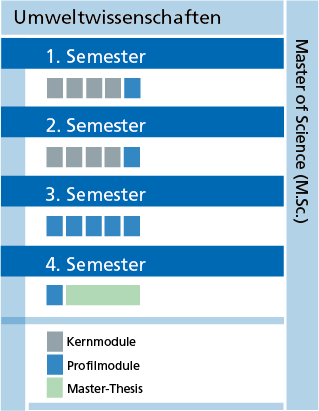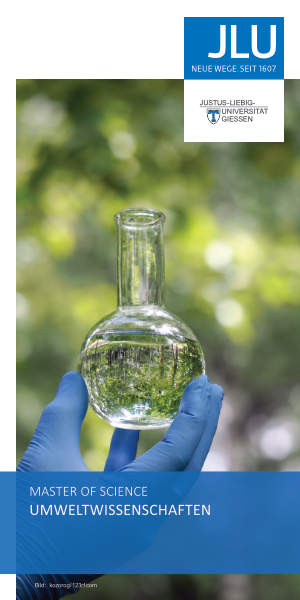Environmental Sciences (M.Sc.)
Taught in German
Overview
-
Picture: kozorog/123rf.com
- Overview
-
Overview
The Master's course "Environmental Sciences" is a consecutive study programme, which is based on a completed and relevant Bachelor's degree. Further information about the admission can be found under "Application"
The course of study deals with the ecological results of the cultivation of land. The aim is to measure the effects of this cultivation on the environment, to evaluate them and then to possibly introduce measures to work correctively against these effects in order to ensure a reliable production of food which is also in harmony with the environment. For this there is a need for adherence to the principles of soil science, ecological and regional planning, applied microbiology, landscape ecology, rural management and waste management.
There will be teaching and research in these areas:- Waste Management,
- Soil Science,
- Soil Conservation,
- Landscape Ecology and Landscape Planning,
- Duration of studies 4 Semester 120 Credit Points (CP)
-
Duration of Studies
4 Semesters - 120 Credit Points (CP)
-
Accreditation
since 28 September 2007
Composition of the Study Programme
- Composition
-
Composition of the Study programme
 During your studies you will deal with the consequences of land management for our environment and the possibilities of sustainable food production. The aim is to measure, evaluate and, if necessary, correct the effects of human activity on the environment.
During your studies you will deal with the consequences of land management for our environment and the possibilities of sustainable food production. The aim is to measure, evaluate and, if necessary, correct the effects of human activity on the environment.
You are fundamentally involved in soil science, landscape ecology, waste management, microbiology, material flow management, hydrology, resource management, environmental analysis, geoinformatics.
Teaching and research is carried out in the following areas:- Waste management,
- Soil science,
- Soil conservation,
- Landscape ecology and landscape planning.
Modules
The degree course consists of 20 modules:
- 8 core modules (mandatory)
- 8 specialisation modules (optional)
- written thesis (equivalent to 4 modules).
Half the taught modules are mandatory (core modules) the other half of the modules can be selected from all the courses offered by the department or partially by other departments in the JLU (specialisation modules).
Specialisation is possible through the selection of the profile modules.
The core modules (mandatory) are:- Soil Conservation and Decontamination
- Quantitative Hydrology
- Stocktaking of Soil and Site Evaluation for Land Use
- Applied Statistics
- Ecology of Agricultural Landscapes
- Microbial Ecology
- Environmental Chemistry
- Resource Economics, Sustainability, and Environmental Management
Through the selection of certain specialisation modules it is possible to acquire the following areas of specialisation which will be shown in the Master’s degree certificate.
- Landscape Ecology and Nature Conservation
- Environmental Chemistry and Ecotoxicology
- Resource Management
Master's Thesis
With the Master's thesis the students will demonstrate their ability to work independently on scientific problems in one of the focus areas of their subject and the course is then completed.
-
Further Information
A description of the core- and specialisation modules can be found in the special regulations with module descriptions and module plans (in German)
More on this... ("Spezielle Ordnung")
Courses offered in the course catalogue
- Electronical course catalogue (in German)
Application
- Commencement of Studies in the Winter and Summer Semester
-
Commencement of studies
Summer semester and winter semester
- A start of studies in the winter semester is recommended.!
- Application: Entrance Requirements
-
Entrance requirements
The entry prerequisite for a Master’s degree course is a Bachelor’s degree with a relevant subject profile. Relevant Bachelor degree courses of a German university are:
- Agricultural Sciences
- Biogeosciences
- Geoecology
- Ecosystem Management
- Environmentalgeosciences
- Environmental Management
- Environmental Natural Sciences
- Environmental Sciences
Applicants who hold a Bachelor’s degree in Nutritional Sciences or Nutritional Sciences and Home Economics at the time of application must have passed six modules (or comparable modules) from the following list:
- Soil and Landscape Ecology
- Recycling and Waste Management
- Basics in Landscape Hydrology
- Agriculture and Environment
- Basics in Ecology and Soil Science
- Pollutants in the Environment
- Nature and Landscape Management
- Resource Utilisation, Environmental Protection and Policy
- Ecological Soil Functions
- Water Quality and Nutrient Fluxes
- Soilscapes of Middle Europe
- Agricultural Utilization of Waste
- Vegetation Ecology
- Business Environmental Management
- Nature Conservation Monitoring
Descriptions of these modules can be found in the catalogue of modules.
In the context of the application and admission process the Examination Board may recognise other final degrees as equivalent on a case-to-case basis.
- Application not limited
-
Application for admission and registration
- The intake capacity of this degree programme is not limited internally by the university.
- Applications must be received by the JLU Student Secretariat by 15th January for the summer semester and 15th July for the winter semester. More on this...
- Special regulations apply to foreign applicants or those who gained their university-entrance qualifications abroad. Read more...
Career Options
- Career Options
-
Career options
As a graduate of environmental sciences, employment in a whole range of fields is possible. For example activities in the chemical and waste management industries can be considered. Environmental scientists are also in demand in the building materials and paper industries.
Their technical expertise is also in high demand in authorities and ministries in relevant specialist presentations.
If you are considering a doctorate, the research and science sector also offers you a career opportunity.Doctoral Studies at JLU
Doctorate possible with a Master's degree for the degree Dr. rer. nat.
Graduate Centres
International Giessen Graduate Centre for the Life Sciences
International
- Incomings
-
Information about studying at Justus Liebig University Giessen (incomings)
-
- International Office
General counseling of international students
Dr. Saltanat Rakhimzhanova, Patrycja Zakrzewska
Goethestr. 58, Room 38
35390 Gießen
Contact and office hours
- International Office
-
Further Information
- Further Information: Documents
-
-
PDF documents for the courses of study
- Study Guide (in German)
Examination- and study regulations
- Special regulations (in German)
(Please note that only the German version of the modules is offical and legally binding. The english Version is for informative purposes only.) - General study regulations for modular and multi-stage study programmes
Courses offered in the course catalogue
- Electronical course catalogue (in German)
- Study Guide (in German)
-
- Master's Degree Programmes of Faculty 09
-
- Agricultural & Resource Economics
- Agrobiotechnology (taught in English)
- Bioinformatics and Systems Biology (in cooperation with faculties 07, 08, 10, 11)
- Food Economics
- Nutritional Sciences
- Beverage Technology (in cooperation with Geisenheim University)
- Insect Biotechnology and Bioresources (taught in English)
-
Oenology (in cooperation with Geisenheim University)
-
Wine Economics (in cooperation with Geisenheim University)
- Any Questions
-

Any Questions?
Information- and advisory services of JLU can be found under the category “contact” on this page!
Contact
-
Subject Advisor
- Subject Advisor
-
Prof. Dr. Dr.-Ing. Peter Kämpfer
Institut für angewandte Mikrobiologie
IFZ - Heinrich-Buff-Ring 26-32
35392 Giessen
Phone: 0641 - 99 37352Office hours: by appointment
-
Links
-
Central Study Advisor
- Anja Staffler
- Central Student Services
-
- Students office →
(for formal matters like matriculation) - Central student advisory office
(advice for students & prospective students) - Hotline Call Justus
(first contact for all matters pertaining to studies) - International office →
(for international students)
- Students office →

